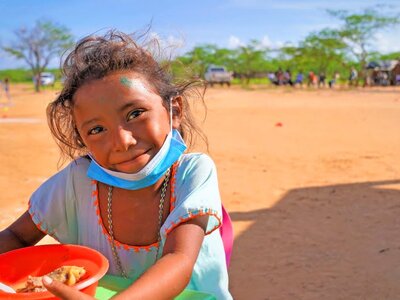Colombia
- 13 million
- people are food insecure
- 1 million
- people assisted by WFP over the past year
- 51.6 million
- population
Although Colombia is classified as an upper-middle income country, it ranks second in Latin America and the Caribbean and seventh in the world in terms of income inequality.
Food security improved between 2022 and 2023. However, one out of four Colombians are food insecure.
One of the main catalysts for food insecurity is armed conflict. There will unlikely be peace with high levels of food insecurity, and food-insecure people may become victims of conflict and illicit businesses.
A peace agreement between the Government and Revolutionary Armed Forces of Colombia (FARC) in 2016 signaled an end to almost six decades of conflict, though other armed groups still operate in the country.
The conflict left hundreds of thousands of people dead, displaced 8.4 million people and was characterized by widespread human rights violations.
While it is a generational task to mitigate the consequences of decades of conflict, the fact conflict continues in many parts of the country represents a serious hurdle to achieving food security.
The World Food Programme (WFP) supports the Government's efforts to achieve zero hunger through approaches including cash-based transfers, local purchases through farmers' associations and the promotion of sustainable enterprises. These tools also work to prevent malnutrition, including micronutrient deficiencies and obesity, especially in school-aged children.
Ensuring that the most vulnerable populations have permanent access to a nutritious, balanced and diversified diet is the focus of WFP's actions in Colombia.
Children, breastfeeding and pregnant women, ethnic groups, victims of violence, confined and displaced communities, smallholder farmers, migrants and host communities are the population groups identified as priorities to ensure their food and nutrition security.
What the World Food Programme is doing in Colombia
-
Capacity strengthening
-
WFP provides local public and private institutions with technical support for the development of policies and the design, delivery and evaluation of programmes to address malnutrition and food insecurity, with a special focus on former conflict areas. It aims to improve capacities in disaster risk reduction and in strengthening the country’s social protection system, hoping to make it more shock responsive. Building on WFP’s experience implementing school meals in La Guajira and in many countries in the world, WFP aims to help many departments in Colombia to improve their school meal programmes with a focus on local procurement.
-
Food security
-
Nutrition
-
Support for smallholder farmers
-
Resilience and livelihoods
Colombia news releases
Go to pagePartners and donors
Find out more about the state of food security in Colombia
Visit the food security analysis pageContacts
Office
Calle 81 # 11 08, Piso 7, 8 and 12 Edificio 8111 Bogotá
Bogotá
Colombia







